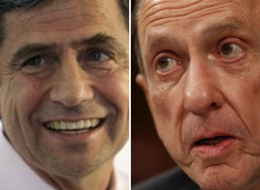With Fed Chairman Ben Bernanke up for confirmation of his new term, it bears remembering that - although he wasn't known by the public at the time - now-Chairman Bernanke was on both the Fed Board of Governors (under Greenspan) and the US Council of Economic Advisors. As
Dean Baker points out (and has repeatedly mentioned in the past), Bernanke thus bears a substantial amount of responsibility for not reigning in the rampant financial and real estate speculation that led to this whole mess in the first place.
In the midst of all the political changes associated with the Obama era, it is important to remember that the current crisis has its roots as far back as Clinton's second term. In fact, if there is one thing I object to about the Obama administration, it is that the current economic policy team has been in the halls of power for well over a decade, and has presided over the persistent deregulation of financial markets worldwide. Bernanke, Summers, Geithner, and Greenspan were largely responsible for many of the causes of the current mess. I previously posted a discussion of the domestic causes of the crisis
here.
For a refresher, they were:
(1) Interest rates, since 1980s stagflation, were kept perpetually below 6%, even in boom periods. These low rates helped feed the dot-com boom, speculation in Mexico and Asia (and Russia) in the mid-1990s, and the bubbles preceding the current crisis.
(2) Deregulation of financial markets under Clinton, approved of and argued for by both Larry Summers and Alan Greenspan (and implicitly by Ben Bernanke, given the Fed's position at the time). This is eerily reminiscent of the problems surrounding nearly every major financial crisis since 1990 - including the Savings and Loan Crisis, the Mexican peso crisis, and the Asian Financial crisis.
(3) The persistent maintenance of a strong dollar vis-a-vis, particularly, the Chinese renminbi. This led to a persistent current account deficit, and related capital account surplus, fueling the speculative bubbles. Again,
as Dean Baker has pointed out, these imbalances are well within our control (though his proposed solution might be a bit extreme). Incidentally, this is also why the "China will dump US debt" scare
is a sham.
The imbalances discussed above are readily recognized by any graduate student in economics or political economy - in fact, some of my undergraduates with minimal economics training have noticed them as well. It is utterly inexcusable that Bernanke, Summers, et al. failed to recognize their importance, and such ignorance can only be explained by either (a) greed or (b) ideological blindness in the face of clear evidence. In the first case, these individuals are corrupt; in the second, they are wholly incompetent.
It is time we said enough is enough.



